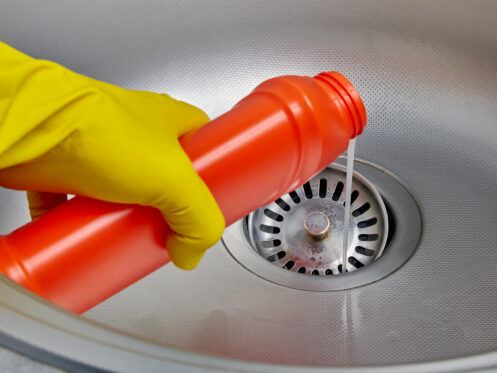Are you wondering whether your home could benefit from professional drain cleaning? Even if your residence doesn’t have any clogged drains at the moment, this type of maintenance benefits the plumbing as a whole. You can use drain cleaning to make your home more comfortable while also improving your water conservation efforts.
How Does Drain Cleaning Work?
Professionals have a variety of chemicals and tools to choose from when cleaning drains. Some drains have so much grime and debris buildup in them that they require hydrojetting. This approach sprays water through the drain at an incredibly high pressure, removing buildup and dislodging any stuck debris.
Drains that don’t require hydrojetting often benefit from chemical drain cleaners. The more effective cleaners tend to have some combination of lye and bleach in them. The lye does a good job at destroying the chemical bond between materials that keeps them stuck together. Some cleaners have caustic potash in them. This agent hastens the decomposition process of organic matter. It should be noted that professionals know how to use this type of material without damaging the pipes. Trying this yourself with something purchased over the counter is not recommended.
Another common drain cleaning method is mechanical drain snaking. This method uses a power auger to remove clogs. When a plumber can’t identify what’s causing a drain clog, they might use a video inspection camera. Finding the exact location of a clog is paramount to fixing the problem effectively. You can often trace drain problems in one part of the home to a clog in another area.
How Long Does Drain Cleaning Take?
Most drain cleaning services take anywhere from one to three hours. The severity of clogs or any leaks in the plumbing system will, of course, impact how long it takes to clean all the drains. A lot of plumbers let chemical drain cleaners sit for 30 minutes to an hour before finishing the cleaning process. If you’re dealing with a single clog, the cleaning process might be much shorter. Drain cleaning problems that require replacing the drain pipe can sometimes span the course of a whole day.
Get Rid of Clogs
The most valuable benefit of drain cleaning is that it gets rid of clogs. Even small clogs can be detrimental to your plumbing. They slow water pressure and drainage, leading to an increased risk of backups and overflows. When left unfixed and unattended, clogs can easily leak water onto the floor and cause major damage to a home’s interior. Clogs also cause unnecessary stress on the plumbing system by wearing out caulking, seals, and fixtures. It’s not uncommon for homes with clogs to experience mold growth as a result of the increased moisture in the air. This not only harms your health but can also lead to structural damage.
Improve Water Pressure for Better Comfort
Drain cleaning makes it easier for water to flow throughout the home’s whole plumbing system. It does this by making sure there aren’t any clogs or blockages. This improved water flow translates into better water pressure, which makes taking showers, doing dishes, and washing clothes much more enjoyable.
Eliminate Bad Smells and Strange Noises
If you’ve ever noticed a bad smell or strange noise coming from a drain, there’s likely a clog. Since clogs often largely consist of decomposing material, removing the blockage from the drain should eliminate the odor.
Strange noises coming from the plumbing usually indicate an underlying problem. For example, clogs reduce water pressure, which produces a suction effect by sucking air into the pipes. As the air makes its way through the plumbing, it can produce gurgling noises in the drains. Professional plumbers know how to diagnose odor and noise issues to ensure an effective fix.
Save Water and Enjoy Cheaper Water Bills
Drain cleaning keeps your drains and other plumbing in good shape. It identifies any clogs or leaks, allowing you to fix problems before they get worse. The improved water pressure allows your appliances to use water with the utmost efficiency. This is particularly advantageous to homes with swimming pools, water features like fountains and waterfalls, or gardening areas. The amount of water that you’ll save with improved water efficiency results in cheaper water bills and fewer plumbing repair costs.
How Often Do You Need Professional Drain Cleaning?
Any time you experience a clog, it’s best to call a plumber. Even if it’s in a part of the home that you don’t use often, it can still affect the rest of the plumbing. Having a plumber fix it promptly will reduce potential issues in other areas of the home. In addition to calling in a plumber whenever you have a drain problem, you should have all of your drains cleaned professionally once a year. This type of proactive maintenance is the easiest way to eliminate clogs from one year to the next.
Can Drain Cleaning Be Dangerous?
Drain cleaning can be incredibly dangerous if you attempt to do it on your own. This is because chemical drain cleaners are highly toxic. If you use them without protective gear, you can burn your skin and possibly even poison yourself. DIY drain cleaning is also dangerous because you risk damaging the plumbing system. Chemical cleaners are very corrosive, meaning if you don’t use them properly, they can eat through the pipes.
Professionals have vast experience handling chemical drain cleaners safely. They also have access to tools like drain augers, hydrojets, and video cameras made specifically for drain inspections. A careful and thorough approach is taken during every drain cleaning appointment.
Preventative Maintenance for Clean Drains
You can take certain steps to keep your drains clear throughout the year. For starters, always be mindful of what you put in the drains. People tend to put many things that cause problems into drains. Some of the most common include coffee grounds, eggshells, flour, fats, oils, and bones. None of these substances easily decompose, causing them to adhere to the inside of the drain, resulting in clogs and backups.
Another excellent way to keep your drains clear of clogs is to install screens. Drain screens come in a variety of types, including metal, plastic, and fiberglass. These screens capture hair and other debris that clog drains. Choosing the best screen for each drain depends greatly on its size and type. Measuring the width of each drain will help you choose the right screens.
All the toilets in your home greatly affect the drains and drainage system as a whole. People often think it’s okay to flush items like feminine products, kitty litter, and wipes that have a “flushable” label, but these items never fully break down. As they accumulate in the pipes, they slow drainage. This is why you should never flush anything but toilet paper.
Keeping your home comfortable requires staying on top of its electrical and plumbing maintenance. At Summit Heating, A/C, Plumbing & Electrical, we’re here to help with both. We also offer HVAC maintenance and indoor air quality services. In all these areas, we also handle installation and repair. To learn more about drain cleaning and its benefits for your Denver, CO home, contact us in Littleton today.


